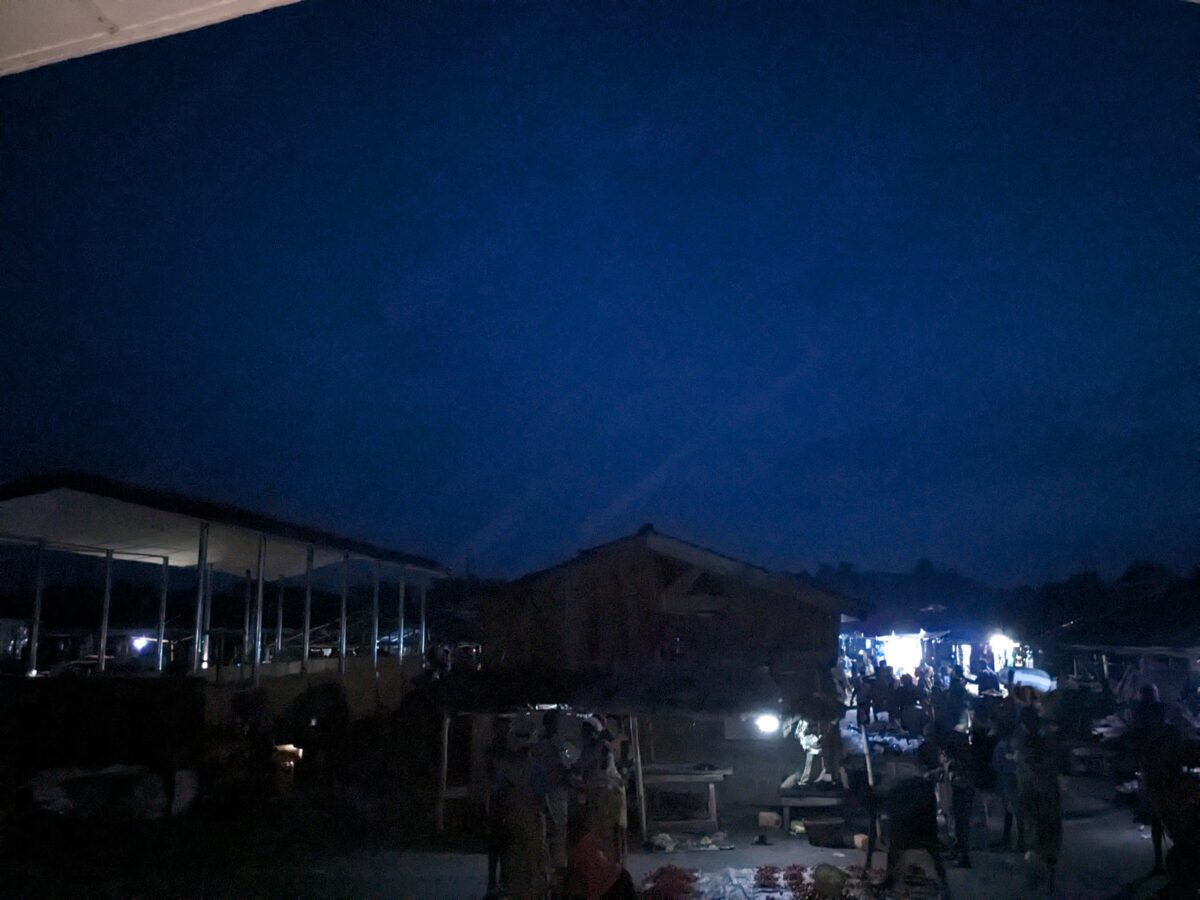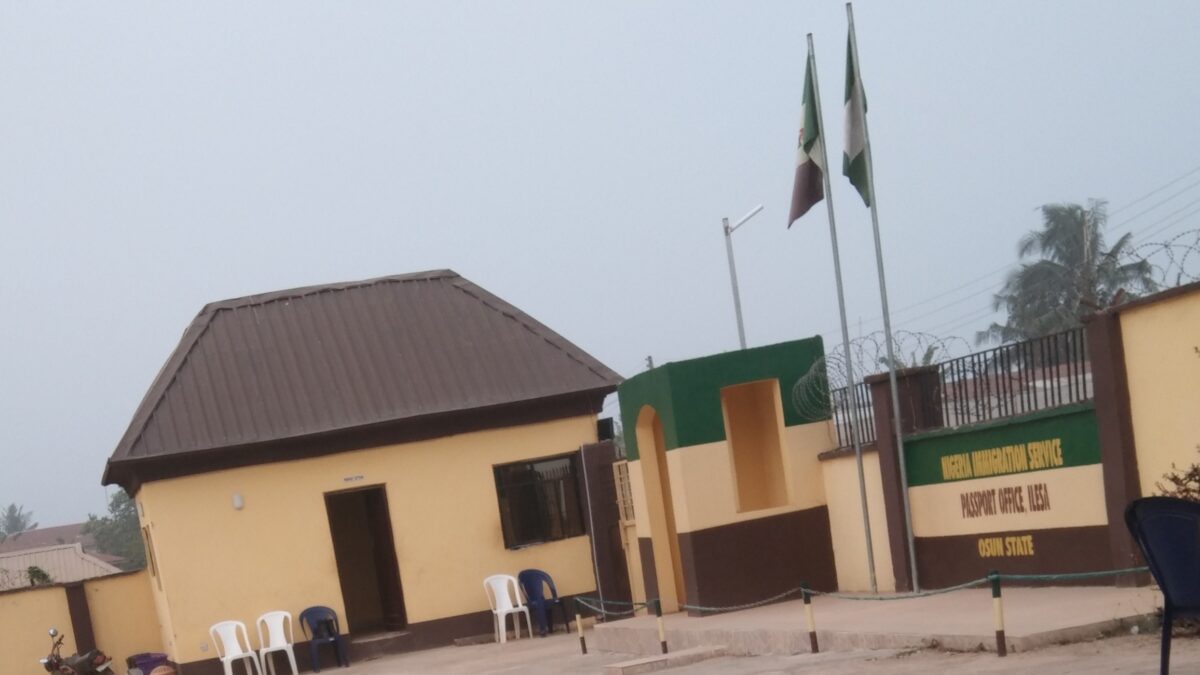In a small town surrounded by water in Ogun waterside, an age-long tradition of trade-by-barter is kept. Every nine days, residents of Makun-Omi and neighbouring towns get their foodstuff ready in exchange for garri, plantain, fish and maybe potatoes. They conduct their transactions seamlessly without the hurdle of currencies. This culture has spanned decades, but it is still as rich as ever.
“Welcome to Imakun,” our driver said. The announcement caught me unaware as I was busy figuring out how to contact Otunba Akorede, my fixer, after realising that telephone communication had disappeared. I had assumed we would drive past this small town like the ones before it, where phone calls were impossible. “You are now in Makun-Omi,” said the driver.
I grabbed my bags and heaved my body out of his Sienna to face the approaching dusk. This was at 6:47 pm. As soon as I made to cross the road leading into the town, an 18-passenger bus conveying people and goods pulled up. They were in Makun-Omi for its Ajebo market, the same reason I was visiting.
While I sat under a shed manned by what seemed to be the union of commercial drivers waiting for Otuba Akorede, a chill descended and swept across the small town. It had rained all morning, and the ground was still wet from the shower. Behind the park was a small military camp where a heavily-built soldier sat caressing his rifle.
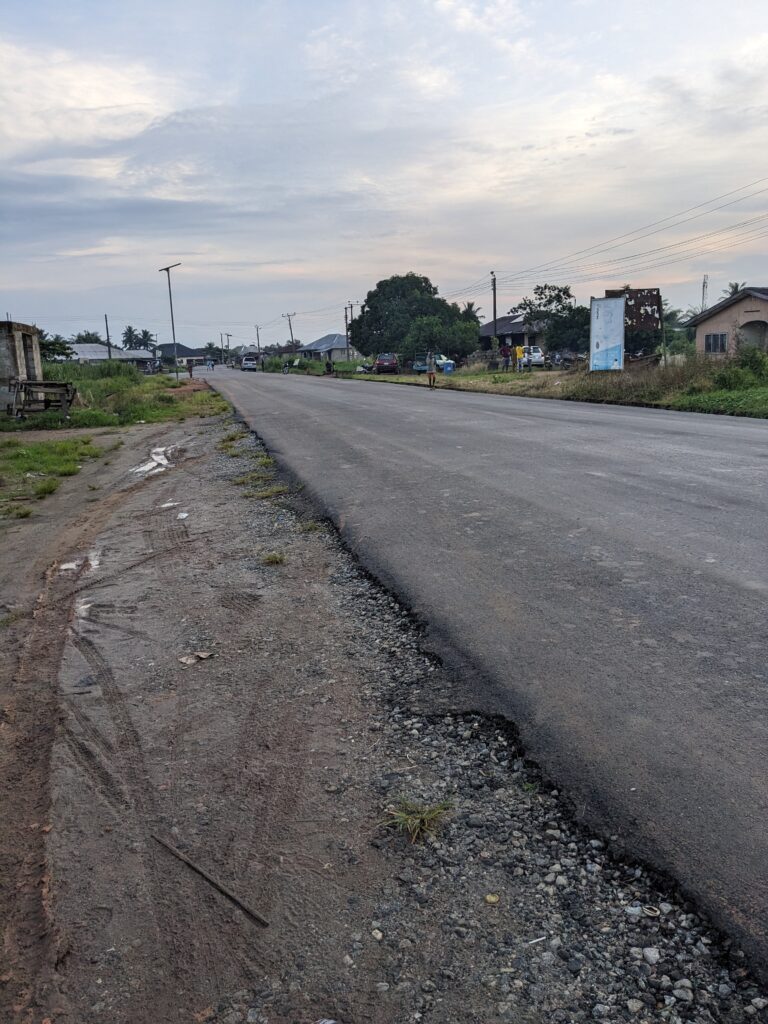
Dark clouds were beginning to creep into the sky when Otunba arrived. He was a fair-complexioned elder with a slim frame and a wide smile. He had a bounce in his step when he took me into Ajebo market. “This market is our pride,” he said. “We have been trading here for decades. The trade by barter is also unique to us.”
Ajebo market stood proudly at the centre of Imakun. Dozens of commercial motorcyclists straddled the edge of the market as they called out to potential customers. From outside the market into the deepest part, traders laid out their wares which went from plastic rubbers to wears, body lotions, vegetables, fruits, mats, phone accessories, seafood, cocoyam, etc. While some called attention to their wares from thatched-roof stalls with open spaces, others had demarcated spaces in newly-built government stalls.
READ ALSO: REPORTER’S DIARY: At Lagos Market Known for Cheap Food Items, I Got 10 Tomatoes for N1000
AN ACTIVE NIGHT MARKET
Men and women haggled over prices and children giggled at their games. The sound of generating sets also added to the symphony. The smell of freshly smoked fish mingled with that of roasted corn and red oil. Dozens of dimly lit torches flickered in the dusk. Charging spots also stood at tiny corners. I was amazed at how the people moved around with ease in the dark night.
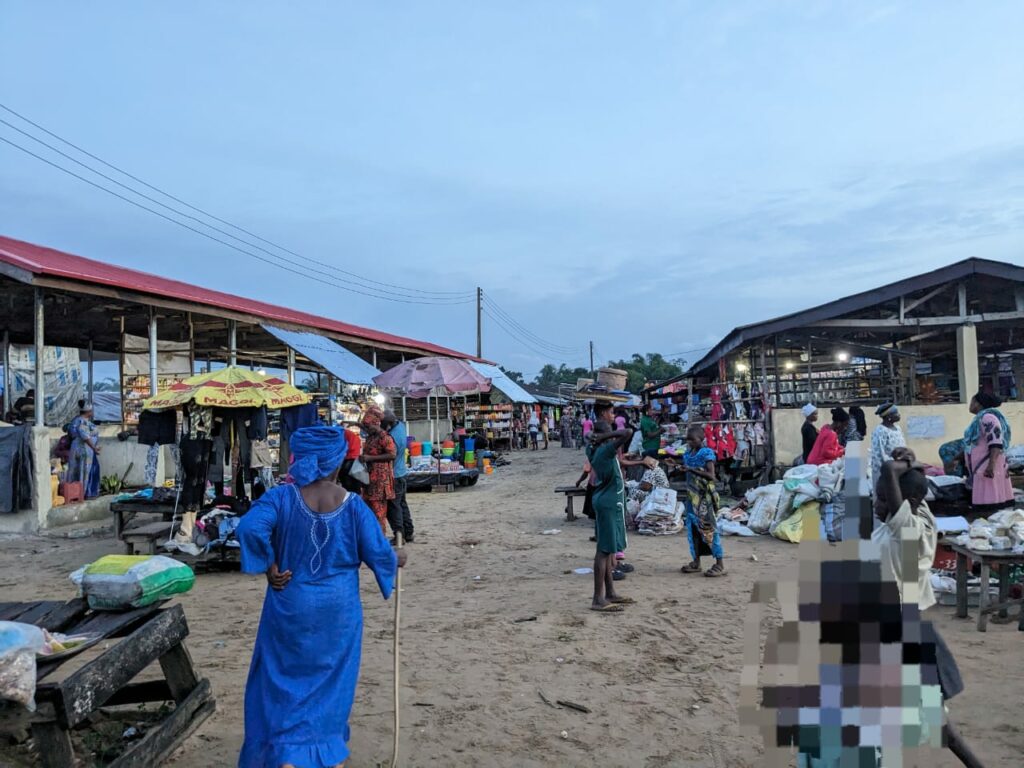
Otunba Akorede introduced me to two other chiefs whose pride in their unique practice could not be concealed. “Here in Ajebo Market, people can barter fish for garri or plantain. Foodstuff is the only thing you can exchange here. The idea is that you approach someone who has what you need and then you give the person what you have. The most common food items used for exchange here are fish and garri. You can trade both items for yam, potatoes, snails, cocoyam, pupuru (cassava flour) and even bananas. Each commodity is valued for exchange based on its current costs. However, we don’t call it trade by barter, we refer to it as ero.”
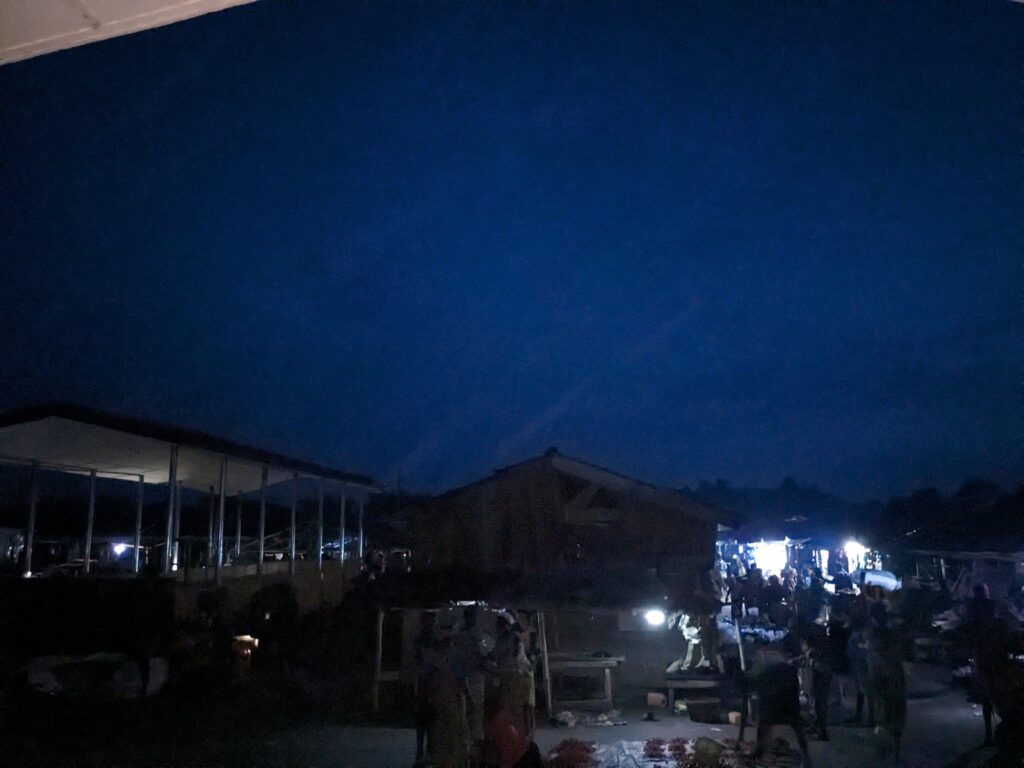
I heard a fusion of different Yoruba dialects in Ajebo Market. Most of the bargaining went from native Ijebu to Ikale, Ilaje and popular Yoruba. The market became fuller as the night wore on. Traders, especially women, called out, “Garri for fish”, “Garri for plantain”, “Fish for garri” to beckon to their customers. Some who were seeking to trade fish had it dangling from three fingers pushed out.
In my wanderings, I ran into Taiwo Adetayo, the secretary of the market, who also boasted about Ajebo. “You will get cheap and quality food items here, especially during the rainy season. The foods produced locally like garri are cheaper compared to what you will get anywhere else. A bowl of garri used to go for N1,000, but it is now about N4,000. This is because of the subsidy removal. But food items are still relatively cheap here.”
“You see this market, the traders will be here till Monday evening,” he said. “The market is usually open for two days. Once it is 2 am, security officials will begin to patrol and stop every active trading. Traders will be mandated to retire to their stalls because of thieves. A market like this has its fair share of robbers whose intents are to cause ruin.”
As we walked further, I happened on my first trade by barter exchange. Two elderly women haggled over the worth of their garri and fish. Both parties disagreed with the exchange as they both felt the other party was going to cheat them. This happened with the second, the third and the fourth exchange I witnessed. I was lucky on the fifth exchange.
On the fifth exchange a woman agreed to trade her over 20 pieces of fish for three paints of garri. The woman who gave her garri told me that she was “thoroughly satisfied with the exchange”.
Adetayo told FIJ that traders would always look for ways to get more value from what is being offered by the other party. Elizabeth Okunola (not real name), a trader from nearby Efire said, “If the value is not more than what I am bringing, it should at least be the same.”
There, they told me that indigenes of Makun-Omi have sustained the trade by barter practice for over three decades and that every single market day, they would always be someone wanting to change what he has for what he needs.
“Trade by barter started at the inception of Ajebo market. It has been in practice for over 30 years. We grew up to know about the market and to also know that it has been consistent. Each single time, there is always someone to barter your goods with,” Okunola said. “Whatever we get, we take them to our houses to eat. These are basically food crops we can’t farm ourselves. We also give our neighbours what they can’t farm too. The tradition was established to ensure that communities close to each other do not lack anything.
“Sometimes, it is difficult to take money to the market to buy food items you can get at an exchange. We just take the ones we have in abundance and offer it for the food we need. Almost everyone values the things they exchange over the ones they buy because barter helps you ensure you only get the best of items.”
A CLASH
The market was colder, but the bubble heightened. It was about 9:30 pm. More torches penetrated the moonless night. A few traders performed their transaction with the aid of local lanterns. The night was going to be good until dozens of feet suddenly ran into the market with screams. Everyone who was in their path also ran. Some people had run a few yards when they said, “We don’t even know why we are running. We should know what the problem is before leaving everything to flee.”
People who had one foot set in flight agreed with the explanation and returned to their stalls with panting hearts. Some ten minutes later, the rush returned. This time, it was with shrieks of “They have killed him oooo.”
“They have butchered him.”
“See blood everywhere.”
“Don’t pour water on him.”
“Carry him to the hospital.”
Several voices spoke at once as people rushed to the scene where a grown man, who I would later know to be the market’s head (babaloja), laid flat on the floor. He had been knocked unconscious by whatever cut his face and made it bloody. I would later learn that his face, from underneath his left eyebrow down to his nose and upper lip, was split by a local bell. His white sokoto and buba were heavily soaked with his blood. The blood ran along his torso to the royal beads on his wrists. While the commotion persisted, someone reasoned that he might die if the market continued to make a spectacle out of him. Two heavy men heaved him up and put him on a motorbike, leaving behind his black local cap.
The market immediately broke into a mad chaos. Mothers held their breast as they screamed for their children, while children scampered around crying for their mothers. Wives held their heads as they searched for their husbands. The husbands also held their torches pointing into every face with a feminine shape. Traders parked their wares hurriedly, leaving behind what they could not carry. A woman unknowingly tossed her bowls of garri into my hands thinking I was her daughter and said, “The market has scattered. The market has become bloody. They have killed Babaloja. They have killed him. We need to hurry home.”
The madness continued into the streets as people pressed into one another eager to get to safety. Rather than go home, the people loitered in front of the health centre where the babaloja was being attended to. Women stood with babies on their backs and bowls of fish or garri on their heads. The men stood akimbo, while youths found spots among the elderly. It looked like a mini-town hall meeting. I later learned that Babaloja was attacked for his abuse of office and misappropriation of funds.
Imakun-Omi went to sleep very late on Sunday evening, as no one knew whether Babaloja would survive the attack.
A BROWN RIVER
Dawn arrived quickly the next day. Before the sun rose, Otunba had returned to the market with his wife. They told me to stay back as I was a stranger and should only come when the sun was up.
Otunba returned to pick me around 9:30 am. First, we visited the town’s only jetty. About five huge boats were docked on the bank. Some men loaded several bags of garri into the boats judiciously. The boats convey traders from Ondo State, which Makun-Omi shares boundary with. Women also sat in the boats unhurried, waiting for the exercise to end. I learned that the exercise could linger until noon before the passengers would set sail. Just by the boats, a few men loaded freshly hewed planks into a waiting truck. The chaos that had plagued the town the previous night was absent here.
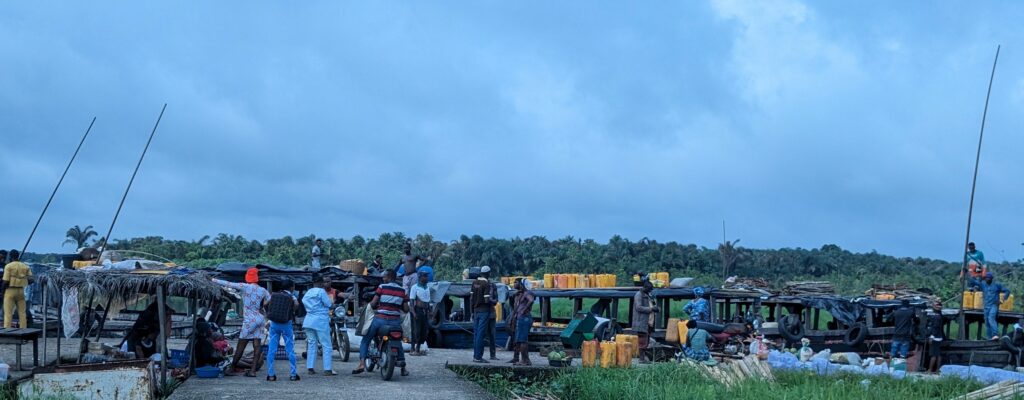
Next, we went into Ajebo, where serenity was visible. A few people gathered in small groups and hushed tones to discuss the fate of Babaloja, and one could hear as their lips muttered his name and title. Otunba told me he was referred from the health centre to a hospital the night before as the cut was deeper than what the centre could handle. The vestiges from the mad rush also littered around the ground. The sun was high up and full trading had commenced, but it seemed like a few people chose to stay home.
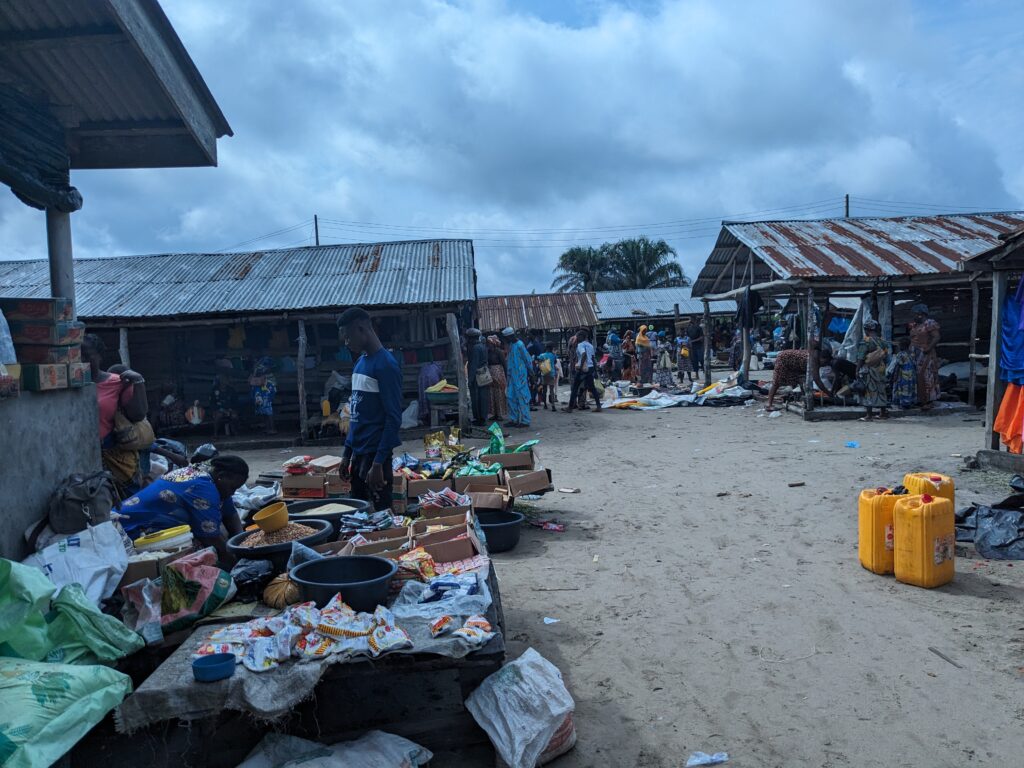
“Some people are still frightened by the incident of last night,” Otunba said.
Aside from the market, Makun-Omi has few attractive spots. The town was sparsely populated. “Most indigenes of the town work outside the community,” one Sarah told me. “The Ajebo market brings a lot of people into the town, and usually, when you don’t buy what you need during the two market days, you will have to wait until the next market days. Sometimes, waiting is tortuous as it could be something you’re in dire need of. The best thing is to plan your shopping ahead of the next market days.”
“We don’t have so many businesses around because it is a relatively small town; you’d know almost everyone in the community.”
I didn’t understand how small Sarah meant until I was told a stream serves most of the community’s water needs: from washing to drinking and other uses.
Sarah had served me a bowl of the water when I noticed its Lipton-like colour. When I objected, she insisted that the water was medicinal and highly sought after by every indigene of the town. She added that it doubled as medicine for anyone with malaria or typhoid. When I didn’t believe her, she offered to take me to the river. The river was a stone’s throw from the community’s only government-owned primary school. There were about four to five buildings within the school compound. Two of the buildings had been abandoned due to their dilapidated state. Another nearly-dilapidated building was in use, however. Only one of the buildings is new.
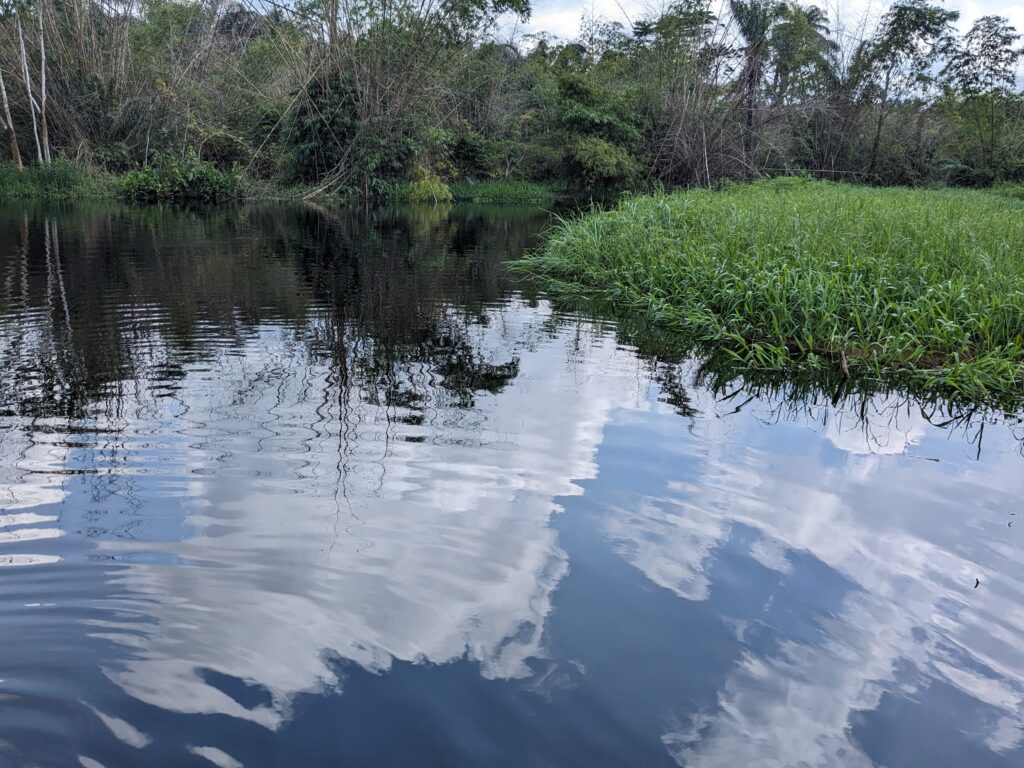
READ ALSO: REPORTER’S DIARY: A Visit to the Other Side of Lagos, Where Alcohol Is ‘Ribena’ to Kids
When we got to Ifara, the stream serving Imakun, it was obvious where the brown water I drank came from. By the stream, a woman and her young daughter did their laundry. I watched in horror as they poured the water back into the stream. I didn’t think much of it until another of the woman’s young daughter blew her nose into the water and then played with the mucus until it was swept away by the slow tide of the stream. I nearly threw up the bowl of water I had gulped earlier.
Otunba told me that indigenes who did not like to drink from the stream dug bore holes for private use but the larger population depended on the stream.
NO POWER FOR FIVE YEARS
Besides having to depend on Ifara solely for all of their water needs, residents of Makun-Omi also have had to put up with a lack of power for almost five years. The people depend on charging spots sprinkled across the town to power their phones. Every day, they pay N150 for a full charge.
“The last time we had power was in 2018. It was faulty at the time, and later we heard that the power cables bringing light into the entire Ogun waterside community had been stolen because they were not in use,” Otunba said.
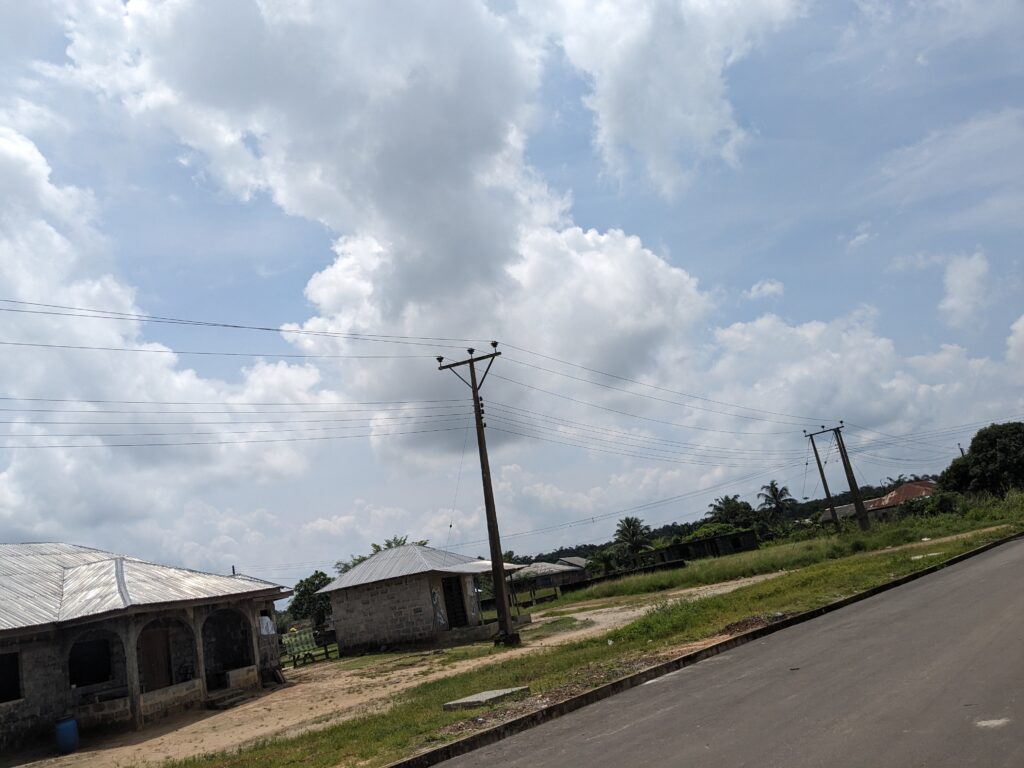
“The government has also refused to intervene. When Governor Dapo Abiodun was elected, he promised to fix the light but he never did. We are only hopeful that he will do it during his second tenure.
“It is not like our transformers are faulty; they are intact and in good shape. We have not just been provided with power since the fault happened in 2018. We have three functioning transformers in Makun-Omi alone; it is just that the entire Ogun waterside has not lit a bulb in such a long while.”
Indigenes of Makun-Omi have carved a perfect world for themselves and held firmly to their beliefs in the midst of a fast-changing society, but just like every other society, their quiet lifestyle is not absolute.
Produced with support from the Wole Soyinka Centre for Investigative Journalism (WSCIJ) under the Collaborative Media Engagement for Development Inclusivity and Accountability project (CMEDIA) funded by the MacArthur Foundation
Subscribe
Be the first to receive special investigative reports and features in your inbox.


